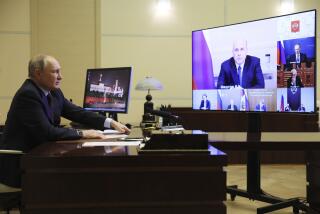The Real Story: We Rejected a Bad Treaty
- Share via
In the aftermath of the Senate’s rejection of the Comprehensive Test Ban Treaty, some in Washington have tried to delve deeply into the psyche of senators who voted against the treaty, searching for hidden political motives to explain its defeat. Various diagnoses have been proffered as the cause of the treaty’s demise, ranging from an urge to embarrass the president to an isolationist tendency to withdraw the United States from international affairs.
The whole spectacle reminds me of the admonition, attributed to Sigmund Freud, about the dangers of looking too deeply for hidden meaning: “Sometimes a cigar is just a cigar.” Simply put, the Senate rejected the treaty because it was a bad treaty that would have jeopardized America’s security.
Opponents of the treaty never appealed to senators to vote against it for reasons of party loyalty. Rather, senators were persuaded to reject the treaty based on the facts about its effect on our security. Six former secretaries of Defense, led by James R. Schlesinger, as well as many other foreign policy experts like Henry Kissinger, opposed the treaty, pointing out that it would have undermined the U.S. nuclear deterrent that has been crucial to guaranteeing America’s security for more than 50 years.
Our nuclear weapons are sophisticated devices with thousands of parts that must function together with split-second timing. As these weapons age, they corrode and deteriorate.
Testing has been essential to maintaining our arsenal. One-third of all U.S. weapon designs fielded since 1958 have required testing to fix problems arising after deployment. In three-fourths of these cases, the problems were only discovered because of nuclear testing. With only nine types of weapons in our post-Cold War arsenal, a serious problem affecting several designs would be of grave concern. Computer simulations and laboratory experiments are valuable tools in maintaining our nuclear arsenal, but they are no substitute for an actual test.
Furthermore, this treaty would not have any meaningful effect on preventing the spread of nuclear weapons; 182 nations, including Iran, Iraq and North Korea, promised never to possess nuclear weapons when they ratified the nonproliferation treaty. Under the test ban treaty, these nations would have been promising not to test the weapons they already promised never to have. And finally, as many experts pointed out, the treaty was not verifiable or enforceable. Nations would have been able to cheat with little worry about being caught or punished. Sen. Richard G. Lugar (R-Ind.), hardly a partisan or isolationist, said the treaty was “not of the same caliber as the arms control treaties that have come before the Senate in recent decades.”
Under our constitutional system, the Senate’s role in treaty-making is of equal stature with the president’s. The Senate’s role is quality control, not rubber stamp. The treaty’s rejection will strengthen the hands of U.S. diplomats in future arms-control negotiations. When they insist on more effective provisions to satisfy a rigorous Senate, their warnings will be credible and influential. Current complaints from abroad will be minor and transitory, especially in light of the permanent harm the treaty would have done to U.S. national security.
More to Read
Get the L.A. Times Politics newsletter
Deeply reported insights into legislation, politics and policy from Sacramento, Washington and beyond. In your inbox twice per week.
You may occasionally receive promotional content from the Los Angeles Times.










